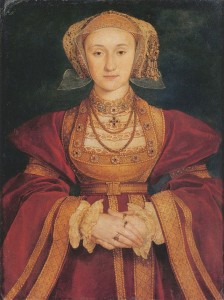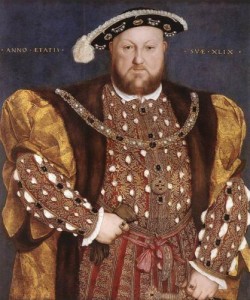
Henry’s third wife, Jane Seymour, had died in October 1537 leaving the King grief-stricken and unable to think of remarrying for some time. Thomas Cromwell, Henry VIII’s chief adviser, was keen to build links with the Schmalkaldic League and when Henry saw that Francis I of France and Charles V, Holy Roman Emperor, were becoming friendly, he too looked towards Germany for support. In January 1539, Henry VIII sent Christopher Mont, a member of Thomas Cromwell’s household, as ambassador to Germany to discuss a possible marriage between the Princess Mary, his eldest daughter, and William, Anne of Cleves’ brother, and to “diligently enquire of the beauty and qualities of the eldest of the two daughters of the duke of Cleves, her shape, stature, and complexion, and, if he hear she is such “as might be likened unto his Majesty,””.1 Mont reported back that “Everyone praises the lady’s beauty, both of face and body. One said she excelled the Duchess [of Milan] as the golden sun did the silver moon”, although he was going on hearsay as he had not seen Anne himself.2
In March 1539, Henry sent ambassadors to Cleves to get further reports on Anne and to get a portrait of Anne but the ambassadors encountered difficulties as Anne and her sister kept their faces covered. In the summer of 1539, Henry sent his court painter, Hans Holbein, to Cleves to paint Anne and her younger sister. When the leading English ambassador, Nicholas Wotton, saw Holbein’s portraits of the sisters, he declared that the artist “hath expressyd theyr imaiges verye lyvelye”3 and that others also considered the portraits a good likeness of the young women. Although we do not know what Henry thought of Anne from her portrait, we have to conclude that he liked what he saw as he continued with negotiations.
On the 4th September 1539 William, Duke of Cleves, signed the marriage treaty promising his sister, Anne of Cleves, in marriage to King Henry VIII.4 The Duke then sent the treaty to England, where it was ratified and concluded by early October. Anne arrived in England on 27th December 1539, landing at Deal on the Kent coast. Anne was met by Sir Thomas Cheyne and taken to Deal Castle to rest after her long journey. There, she was visited by the Duke of Suffolk and his wife, Catherine Willoughby, the Bishop of Chichester and various knights and ladies. She was informed that she would be meeting the King, her future husband, at Greenwich Palace at a formal reception in a few days time, but she was to be taken by surprise.
On New Year’s Day 1540, while Anne was resting at Rochester before travelling on to London, an excited Henry VIII turned up. Henry, the impatient and hopeless romantic, just couldn’t wait for his bride to arrive in London and was desperate to see the woman from the portrait, so he decided to follow the chivalric tradition of meeting his future bride in disguise. Tradition said that the love between them would be so strong that Anne would see through his disguise and recognise her future husband, however, as Elizabeth Norton points out, Henry should have learned from the disastrous meeting between his great-uncle, Henry VI, and his bride, Margaret of Anjou.5
 Henry VIII arrived at Rochester on 1st January 1540 and sent his attendant, Sir Anthony Browne, ahead of him to tell Anne that he had been sent by the King with a New Year’s gift for her. Browne told Anne and then Henry, in disguise as a lowly servant, entered the room. Anne was not paying much attention to this servant, as she was watching bull-baiting out of the window, so Henry pulled her towards him in an embrace and tried to kiss her. Anne was obviously shocked at such behaviour from a servant, so obviously did not respond to his advances and Henry’s dreams of her seeing through his disguise and falling into his arms lay shattered. The meeting was a complete disaster and the King was humiliated. It was not a good start and Henry decided he did not want to marry this woman. Unfortunately, there was nothing that could be done without offending Anne’s brother, the Duke of Cleves, so the marriage went ahead.
Henry VIII arrived at Rochester on 1st January 1540 and sent his attendant, Sir Anthony Browne, ahead of him to tell Anne that he had been sent by the King with a New Year’s gift for her. Browne told Anne and then Henry, in disguise as a lowly servant, entered the room. Anne was not paying much attention to this servant, as she was watching bull-baiting out of the window, so Henry pulled her towards him in an embrace and tried to kiss her. Anne was obviously shocked at such behaviour from a servant, so obviously did not respond to his advances and Henry’s dreams of her seeing through his disguise and falling into his arms lay shattered. The meeting was a complete disaster and the King was humiliated. It was not a good start and Henry decided he did not want to marry this woman. Unfortunately, there was nothing that could be done without offending Anne’s brother, the Duke of Cleves, so the marriage went ahead.
The chronicler Edward Hall describes Anne on her wedding day:
“Then the Lordes went to fetche the Ladye Anne, whiche was apparelled in a gowne of ryche cloth of gold set full of large flowers of great & Orient Pearle, made after the Dutche fassion rownde, her here hangyng downe, whych was fayre, yelowe and long: On her head a Coronall of gold replenished with great stone, and set about full of braunches of Rosemary, about her necke and middle, luelles of great valew & estirnacion.”
The King wore “a gowne of ryche Tyssue [cloth of gold] lyned with Crymosyn”.6
Hall records that Anne curtsied to the King three times and then the couple were married by Thomas Cranmer, the Archbishop of Canterbury. Anne’s wedding ring was engraved with the words “GOD SEND ME WEL TO KEPE”.
After the ceremony, the bride, groom and guests enjoyed the usual wine and spices, followed by “Bankettes, Maskes, and dyuerse dvsportes, tyll the tyme came that it pleased the Kyng and her to take their rest”. It was time for the all-important consummation of the marriage, something which seems to have been a complete disaster. The next morning, when Thomas Cromwell asked a rather bad-tempered Henry what he thought of his queen, Henry replied:
“Surely, as ye know, I liked her before not well, but now I like her much worse. For I have felt her belly and her breast, and thereby, as I can judge, she should be no maid… [The] which struck me so to the heart when I felt them that I had neither will nor courage to proceed any further in other matters… I have left her as good a maid as I found her.”7
Henry discussed the matter with his physicians, telling them that “he found her body in such sort disordered and indisposed to excite and provoke any lust in him”. Henry was unable to consummate the marriage and blamed it on Anne’s appearances, for he “thought himself able to do the act with other, but not with her”.
On the 6th July 1540, a messenger was sent to Anne to inform her of her husband’s concerns over their marriage and to obain her consent for a church court to investigate. Anne, who must have been terrified after what happened to Anne Boleyn, gave her consent. On the 7th July 1540 a convocation of clergy agreed that “the king and Anne of Cleves were no wise bound by the marriage solemnised between them, and it was decreed to send letters testimonial of this to the king.”8 The invalidity of the marriage was proven by three pieces of evidence: 1) The betrothal between Anne and Francis of Lorraine, 2) Henry’s lack of consent to the marriage and 3) Lack of consummation – Henry declared that “I never for love to the woman consented to marry; nor yet if she brought maidenhead with her, took any from her by true carnal copulation”.9 When Anne was informed of this she wrote to the King confirming that she accepted the annulment. Anne was rewarded handsomely for her acceptance of the situation, receiving jewels, plate, hangings, furniture, money, houses at Richmond, “Blechinglegh” (Bletchingley) and Lewes, and also Hever Castle, the former Boleyn family home. On 28th July 1540, just weeks after the annulment, Henry VIII married his fifth wife, Catherine Howard.
You can read more about the end of Henry’s marriage to Anne of Cleves in my article Henry VIII divorces Anne of Cleves.
Notes and Sources
- LP xiv. Part 1. 103
- Ibid., 552
- LP xiv. Part 2. 33
- LP xiv. Part 2. 286
- Anne of Cleves: Henry VIII’s Discarded Bride, Elizabeth Norton
- Hall’s Chronicle, Edward Hall, p836
- Burnet, Vol II, p. lxxxvi, quoted in “Thomas Cromwell: The Rise and Fall of Henry VIII’s Most Notorious Minister”, Robert Hutchinson, Chapter 10.
- LP xv. 860
- Burnet